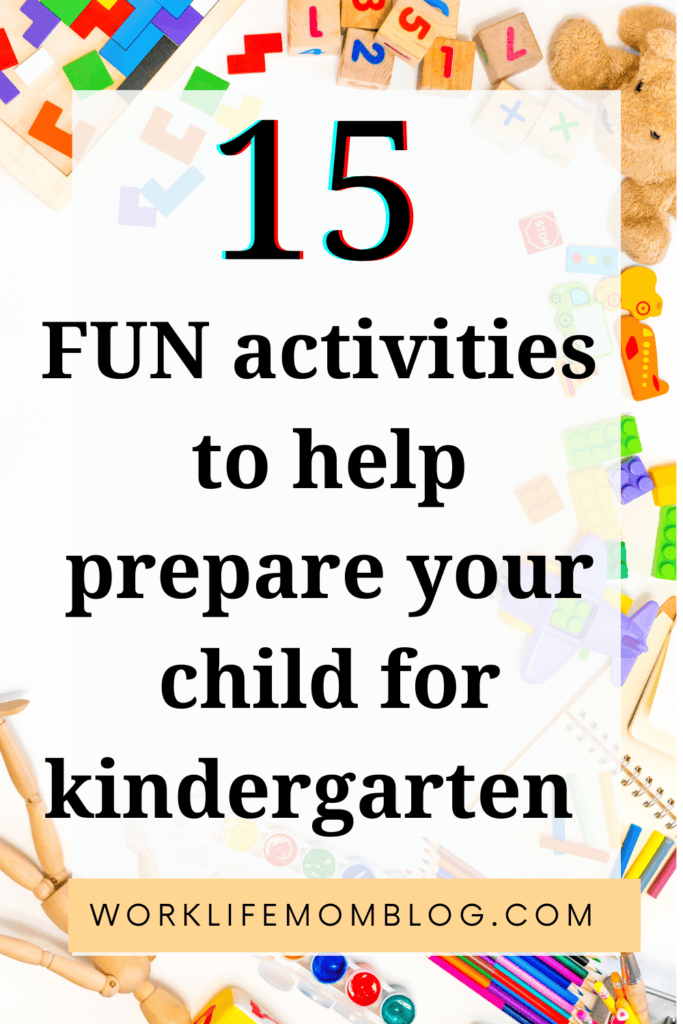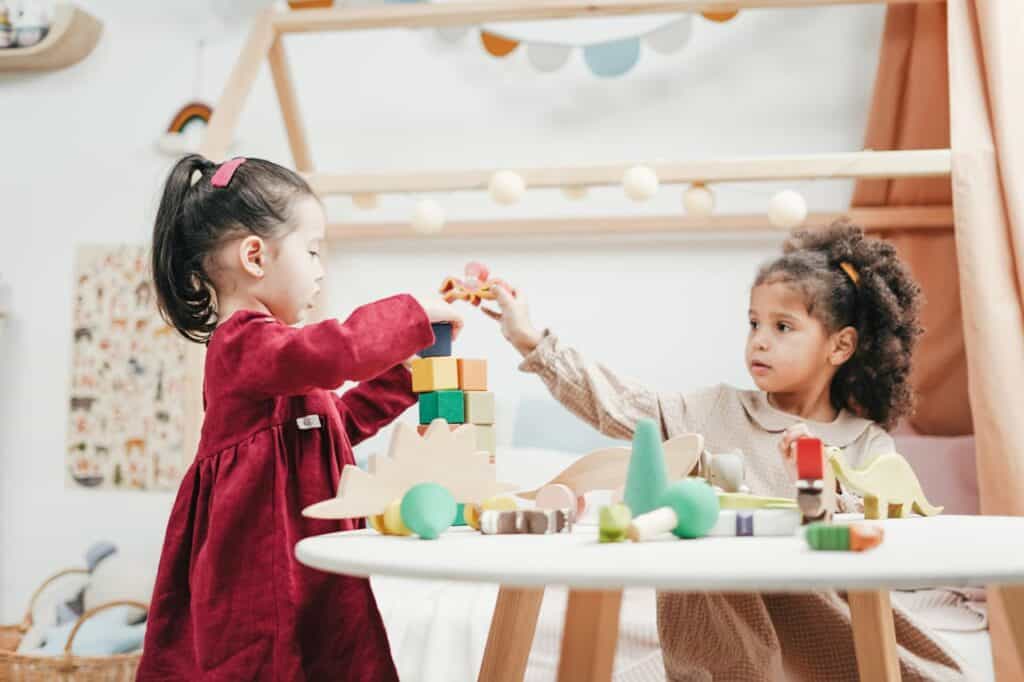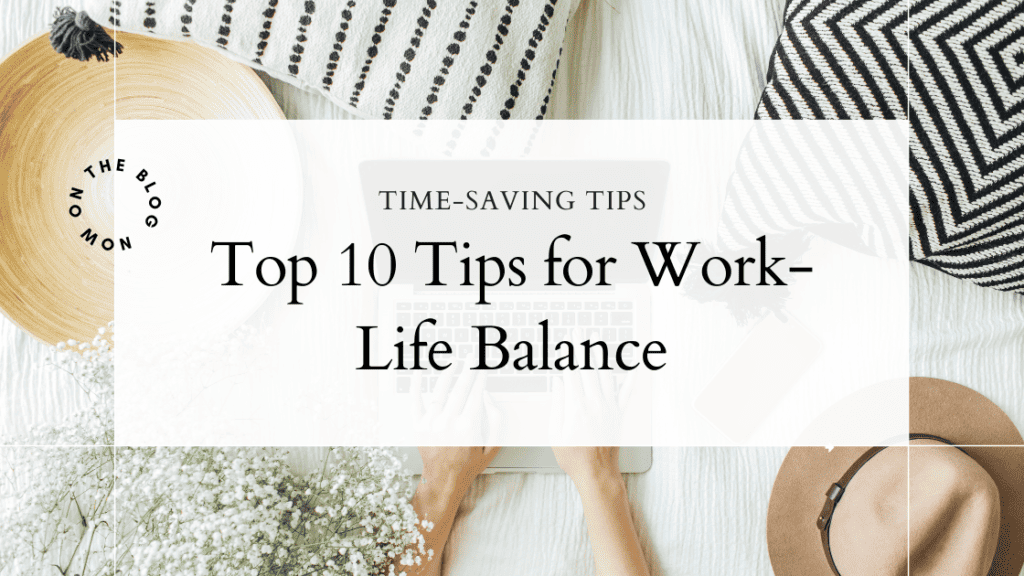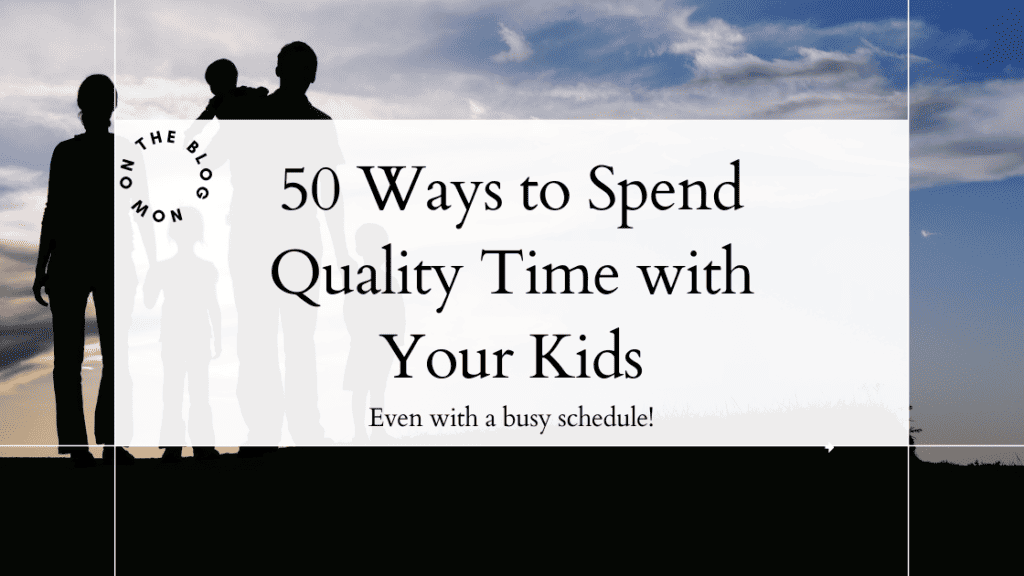Getting a child ready for kindergarten can feel very overwhelming. As a parent, we worry about whether or not they will be ready, how they will feel on their first day, and how WE will cope with having them take that next big step. Thinking about all of those things can make us want to pull our hair out, scream into our pillows, and squeeze those sweet little babies a little tighter because they are just growing up too fast.
But what if I told you that you are likely already doing so many things that will help your child be kindergarten-ready without even knowing it? Parents and caregivers are their child’s first teacher and all of the interactions you have with them on a daily basis are helping them learn and getting them ready for kindergarten. As a parent who has been there (twice) and a former preschool and kindergarten teacher, I want to let you know that YOU’VE GOT THIS.
There will still be challenges along the way, but the tips in this post will highlight some easy things you can do to give you and your child the extra boost of confidence you need to start kindergarten.
This post contains affiliate links. As an Amazon associate. I may earn from qualifying purchases.
Table of Contents
Things to Remember About Being Ready for Kindergarten
Before I get into the activities and all of the fun things you can do as a family. It’s important that you keep the following things in mind.
- Every child learns at their own pace. They will continue to learn and grow when they are ready and not every child will do the same things at the same time.
- Children do NOT have to know everything before they start school. Your child’s teachers will meet them where they are when they start kindergarten to help them be the best they can be.
- Academics are not the only indicators of “readiness.” While having certain academic skills may give your child a boost to help them be ready for kindergarten, they are not the only things that help them get ready. Social-emotional skills, self-help, and routines are equally as important when preparing for school.
Fun Learning Activities
Getting ready for kindergarten doesn’t have to feel like school. Making the most of everyday moments is one of the best ways to encourage learning while having fun with your child. Young children learn best through play, so most of the suggestions can be done anywhere, anytime, and without the use of expensive kits or materials. If you do just one of these every day, your child will have an easier time as they transition to kindergarten.
Talk, Talk, Talk
One of the best ways to build your child’s vocabulary and help them learn is to have conversations with them. When you talk to your child, they are learning new words, understanding the back and forth of conversations, and learning how to put sentences together. They are also learning important listening skills that will help them in school. Here are some tips for making the most of your time talking with your child:
- Get on their level. Children will feel more comfortable talking with adults when they are close to them and not standing over them. Kneel down, sit with your child on your lap or next to you so you can make eye contact and also show that you are really listening to what they have to say.
- Wait. Give your child time to think about what they want to say. Young children often need time to think about their answer and put together the words they want to say. If you ask a question or are in a conversation, try pausing for a few seconds to give your child time to respond before asking another question or continuing with the conversation.
- Ask questions. Open-ended questions will encourage your child to talk more and will prompt them to continue the back and forth. These questions do not have a yes or no answer and often require more thought. Try saying things like, “Can you tell me more about that?” or “What would happen if?”
- Add more words. Talk about what you are doing as you explore and play together. If they are on the playground, you might say something like, “Wow, you are climbing all the way to the top of the ladder to go down the slide.” Adding those words help your child learn to say more about what they are doing or seeing.

Photo by Ketut Subiyanto
Outdoor Adventures
Spend time outside and discover learning opportunities through nature walks, scavenger hunts, and visits to the park. As you are walking, encourage your child to observe different plants and animals, find colors in nature, and explore natural materials (soil, leaves, rocks, sand, etc.) to help develop their sensory skills. While you are exploring, ask open-ended questions to help them think more deeply about what they are doing and encourage conversations.
- Nature Walks: Take a stroll through a local park or trail. Point out different trees, flowers, and insects. Ask questions like, “What colors do you see?” or “Can you find something smooth to touch?”
- Scavenger Hunts: Create a list of items for your child to find, such as a feather, a shiny rock, or a red leaf. This activity helps keep them engaged while also working on their observation skills. Asking about the colors or shapes they see or counting the objects they find also helps them build math skills.
- Visits to the Park: Play on the swings, climb the jungle gym, and meet new friends. Socializing and playing helps build physical coordination and social skills.
These activities not only enhance their knowledge but also foster a love for the environment and curiosity about the world around them.
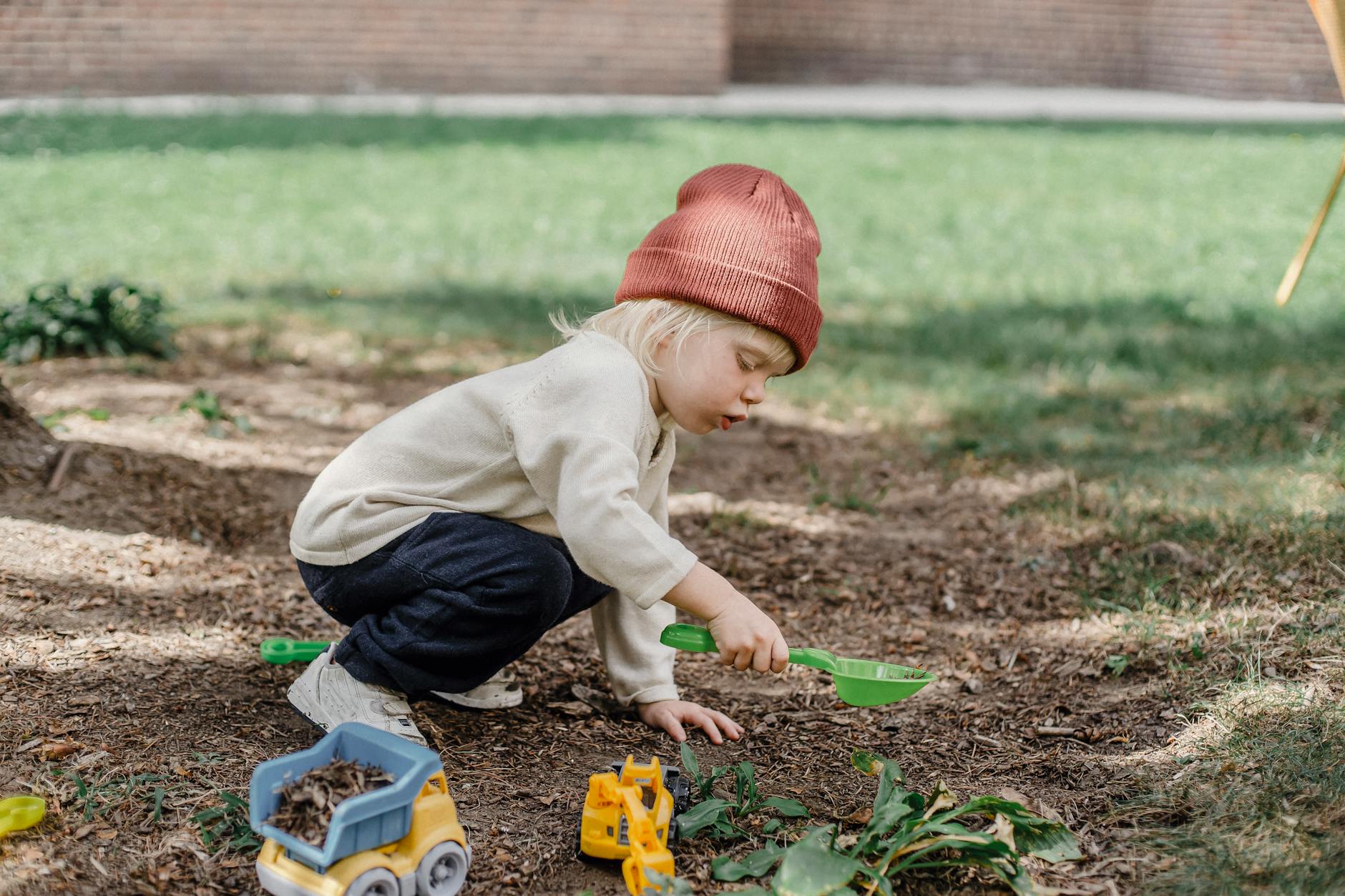
Photo by Allan Mas
Arts and Crafts Galore
Unleash your child’s creativity with arts and crafts projects. From cutting and coloring to gluing and sticking, these activities enhance fine motor skills and hand-eye coordination. Those skills will help your child as they write in kindergarten. Here are some ideas:
- Finger Painting: Let your child paint with their fingers on large sheets of paper. This messy but fun activity is excellent for sensory experience and creativity.
- DIY Puppets: Use old socks or paper bags to make puppets. Add buttons, yarn, and fabric scraps for decoration. This project is great for storytelling and imaginative play.
- Collages: Gather materials like colored paper, magazines, leaves, and twigs. Help your child cut and glue these items to create a unique piece of art. This strengthens their fine motor skills and artistic expression.
- Sicker Books: Find a blank notebook and some sticker packs and let your child create their own sticker book. Stickers are great for fine motor skills and having a book to put them in keeps them from being stuck all over the house.
Now, if you’re like me and feel like more of an Amazon mom than a Pinterest mom. Here are some great supplies you can purchase to help boost that creativity at home:
- Dot Markers are easy for little hands to hold and are a fun new way to get creative.
- Craft Boxes are also a great way to get started. They have everything you need (including ideas) in one box.
- Art Supply Kits are great to have on hand. I like to save a few for a day when we don’t have much going on and let the kids decide how to use the supplies and create whatever they want.
- This Crayola lap desk and case keeps all the supplies in once place and is perfect for taking on the go.
These projects are not only engaging but also have the added benefit of boosting your child’s imagination and providing a sense of accomplishment.
Reading Adventures
When it comes to preparing your child for kindergarten, diving into reading adventures can be both educational and fun. Engaging in different reading activities can help boost your child’s cognitive development and language skills. Here are some tips for reading with your child:
- Make it fun! Find books that they are interested in and get excited about the book. Change your voice with the characters and talk about the pictures.
- Teach them about books. Explain that books have an author and an illustrator and read their names to your child along with the title when you start a book. Point out things like the cover, spine, and title page. Point to the words as you read.
- Relax. Don’t worry about getting through the whole book or having to redirect your child if the book sparks a conversation with them and keeps you from finishing. The important thing is that you are spending the time together.
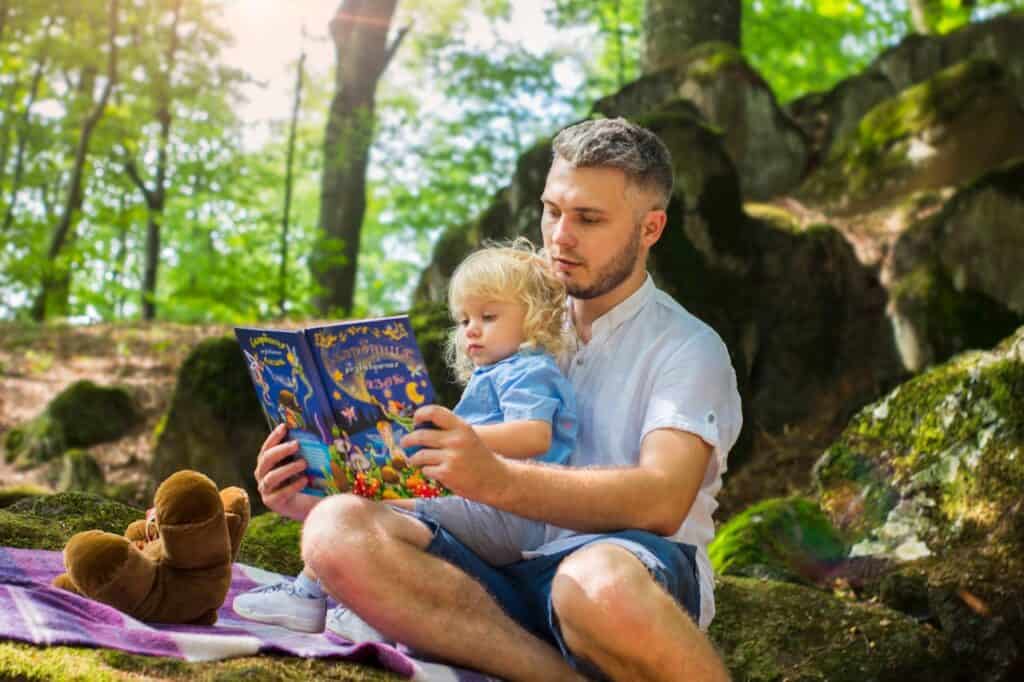
Photo by Andy Kuzma
Storytime Sessions
Storytime sessions are a perfect way to bond with your child while building their language skills. Set aside some cozy moments to read aloud to them. Choose colorful storybooks with that your child is interested in to capture their attention and imagination. While you are reading, talk about new words that your child might not know and talk about the pictures. After reading, take the time to discuss the story together. Ask questions like, “What was your favorite part?” or “How do you think the story will end?” This not only improves their comprehension but also encourages critical thinking skills.
Book Club Fun
Creating a mini book club for your child and their friends can make reading even more enjoyable. Invite a few kids over for book club sessions where they can share their thoughts on a chosen book. Encourage them to express their opinions and listen to others respectfully. This activity not only improves their social skills but also enriches their reading experience by discussing different perspectives and interpretations of the story.
Book clubs can also be a way to share books with other families. Ask each child to bring a couple of books that they no longer read and let the kids swap books. This is a great way to keep the books in your home fresh and exciting without having to buy more books or worry about returning borrowed books to the library.
Books that Teach Concepts
There are so many books out there that teach important concepts for your child to learn. ABC books help them begin to recognize letters. Counting books are a fun way to begin to learn about math skills. Books are also a great way to help children with social-emotional learning. If you notice that your child is nervous around new people, for example, you can find a book on that topic to help them begin to learn ways to express how they feel. The books may also spark conversations to help your child process those feelings and think about things they can do when they feel nervous.
Math Mania
Are you ready to ignite your child’s mathematical curiosity and skills through engaging activities? Let’s dive into some exciting math mania that will have your little one counting and shape-spotting in no time!
Counting
Introduce fun games that involve counting objects or even hopping and skipping numbers to make learning math exciting. Whether it’s counting colorful candies or jumping over numbers you draw on the sidewalk, these activities will not only boost your child’s counting skills but also make math fun!
Here are some simple and exciting counting activities:
- Candy Count: Use colorful candies or buttons and ask your child to count and sort them by color. You can even make patterns with the candies to introduce sequencing.
- Hopscotch Numbers: Draw a hopscotch grid with numbers on the sidewalk. Encourage your child to hop from one number to the next while counting aloud.
- Story Time Counting: Read books that include counting elements, such as “Ten Little Monkeys” or “Five Little Ducks.” Encourage your child to count along as you read.
Make counting fun and try to help your child count to 30 before they start kindergarten. Once they learn that, keep going to see how high they can go!
Shape Detectives
Become shape detectives with your child and set out on a mission to uncover shapes all around you. From spotting circles in everyday objects to finding triangles in your surroundings, this interactive activity will enhance your child’s shape recognition abilities while encouraging exploration and observation.
Get started with these engaging shape-detective activities:
- Shape Hunt: Create a list of shapes for your child to find around the house or in the yard. Set a timer and see how many shapes they can discover.
- Sorting Shapes: Gather various household items like lids, boxes, and utensils, and ask your child to sort them by shapes—circles, squares, rectangles, etc.
- Shape Art: Use cut-out shapes from colored paper and have your child create scenes and pictures. This not only reinforces shape recognition but also sparks creativity.
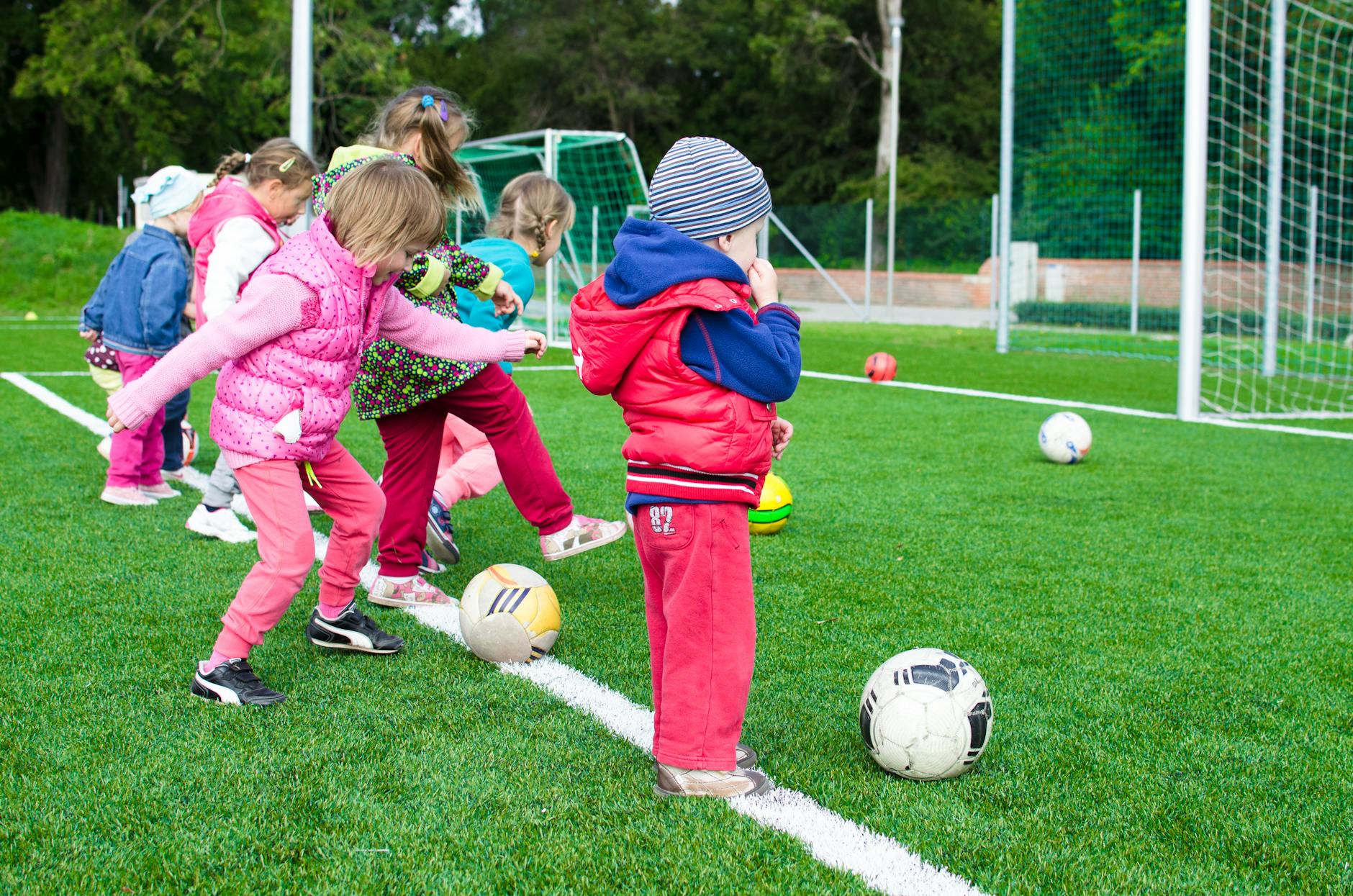
Photo by Pixabay
Social Skills
In the journey of preparing your child for kindergarten, developing strong social skills is key to their success. Children who do well with social interactions tend to have an easier time adapting to new environments and building relationships. Here are two great ways to help your child build up their social skills:
Playdate Power
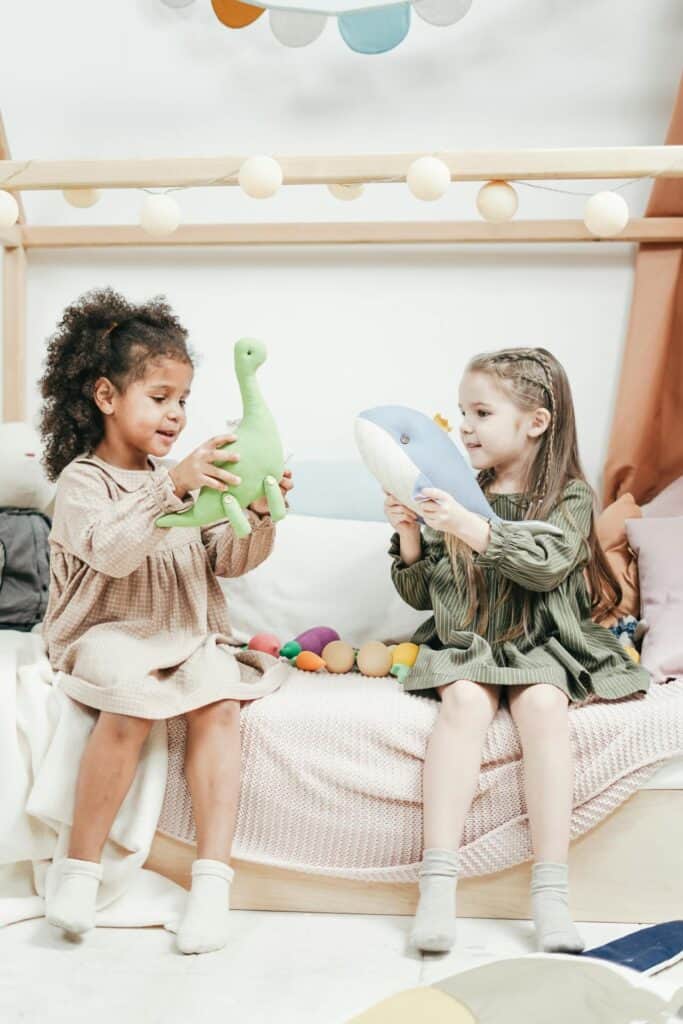
Photo by cottonbro studio
Playdates play a significant role in nurturing social interactions among children. They provide a platform for kids to engage in unstructured play, learn to take turns, share toys, and communicate effectively. Encouraging regular playdates with peers helps your child build confidence, empathy, and an understanding of social cues. It’s through these playful interactions that they learn to navigate friendships and understand the importance of cooperation.
Teamwork
Fostering a sense of teamwork in your child sets the foundation for collaborative skills essential for school and life. Engage in cooperative games or family activities that require teamwork, such as building a puzzle together, playing group sports, or working on a creative project together. These activities promote communication, problem-solving, and a sense of belonging. By experiencing the value of teamwork, your child learns to appreciate different perspectives and work in a group.
For more great family game night ideas, check out this post.
Prep for Independence
Preparing your child for kindergarten goes beyond academic learning—it’s also about fostering independence and building self-help skills. Encouraging independence in your child not only builds their confidence but also equips them with essential life skills. Let’s explore some engaging ways to prep your little one for independence:
Chore Challenge
Introducing age-appropriate chores to your child is a fantastic way to instill a sense of responsibility and independence. Simple tasks like putting toys away, feeding a pet, or setting the table can empower them to help around the house. Start with small responsibilities and gradually increase the difficultly of the task as they learn. This not only teaches them valuable life skills but also instills a sense of accomplishment and self-reliance.
Consider these age-appropriate chores for your little one:
- Putting away toys: Encourage your child to pick up their toys after playtime.
- Feeding a pet: A simple task like filling a pet’s food bowl can give them a sense of duty.
- Setting the table: Involve them in setting napkins, plates, and cutlery.
- Sorting laundry: Ask your child to help you match socks or put away their laundry.

Photo by cottonbro studio
Dress-Up
Engage in dress-up play with your child to practice dressing and undressing, fostering essential self-help skills. Provide a variety of clothing items for them to mix and match, encouraging creativity and independence in choosing outfits. Practice buttoning shirts, zipping up jackets, and putting on shoes independently. These activities not only enhance fine motor skills but also boost their confidence in handling daily tasks without assistance.
Here are some fun activities to try:
- Buttoning and Unbuttoning: Use both real clothes and toy versions to practice this skill.
- Zipping Jackets: Start with larger zippers and gradually move to smaller ones.
- Putting on Shoes: Let them practice with different types of shoes like Velcro, slip-ons, and eventually those with laces.
Health and Wellness Fun
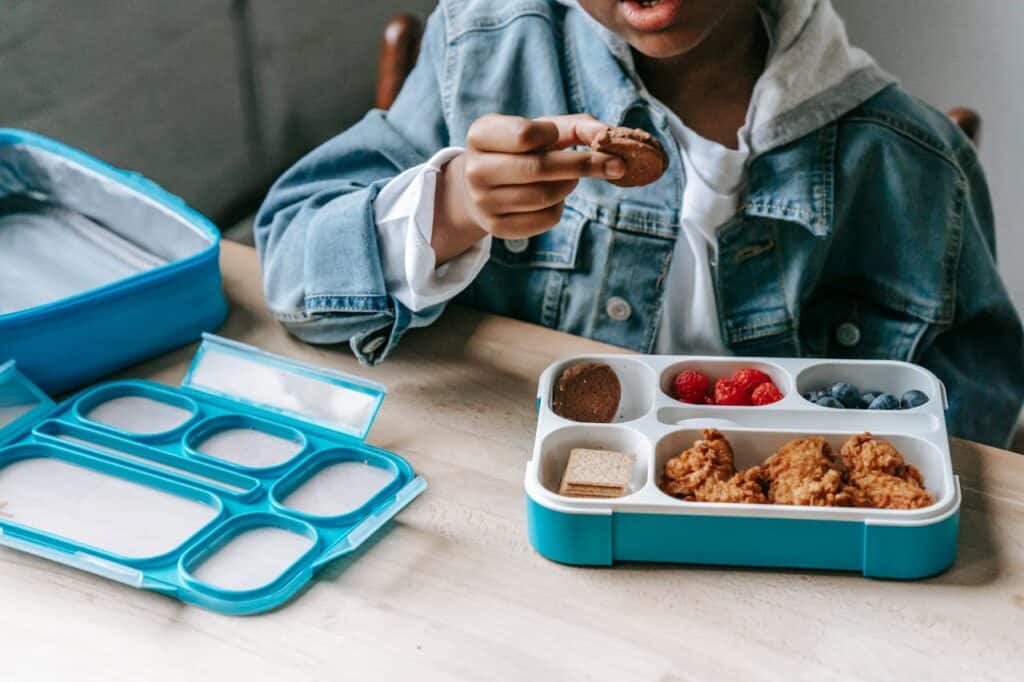
Photo by Katerina Holmes
Yummy Snack Creations
Encourage your child to get involved in creating delicious and nutritious snacks that they will love to eat. Here are some simple and child-friendly snack recipes that you can make together:
- Fruit Kabobs: Thread colorful fruits like strawberries, grapes, and melon onto skewers for a fun and healthy snack.
- Ants on a Log: Spread peanut butter or cream cheese on celery sticks and top with raisins for a crunchy treat.
- Yogurt Parfait: Layer yogurt, granola, and fresh berries in a cup for a tasty and satisfying snack.
- Snack Boxes: Use a Bento Box to let your child build their own snack or lunch box. Talk to them about making healthy choices and ask them to pick a fruit and a vegetable to include. This is also a great way to help prepare your child for eating lunch at school.
By involving your child in the snack-making process, you not only promote healthy eating habits but also teach them valuable skills in the kitchen. To increase the learning potential of these experiences, ask them to count out or measure ingredients. Talk to them about following the steps of a recipe, even if they are simple things like the three steps to creating Ants on a Log.
You can even add in some writing opportunities by writing the recipes down with your child on a recipe card or sheet of paper. They learn by watching you write and talk about the letters and words you are writing. Giving them the pencil (even if they aren’t writing letters yet) and letting them “write” is also a great learning experience.
Dance Party Fitness
Make staying active fun and exciting for your child with dance party fitness sessions. Put on some upbeat music and encourage your little one to dance along with simple dance moves or exercises. Here are some ideas to get the dance party started:
- Musical Statues: Play music and have your child dance around. When the music stops, they have to freeze like a statue.
- Simon Says Dance: Take turns being “Simon” and calling out dance moves for your child to follow.
- Animal Dance Off: Pretend to be different animals while dancing, from hopping like a bunny to stomping like a dinosaur.
These dance breaks not only keep your child active but also improve their coordination and motor skills while having a blast.
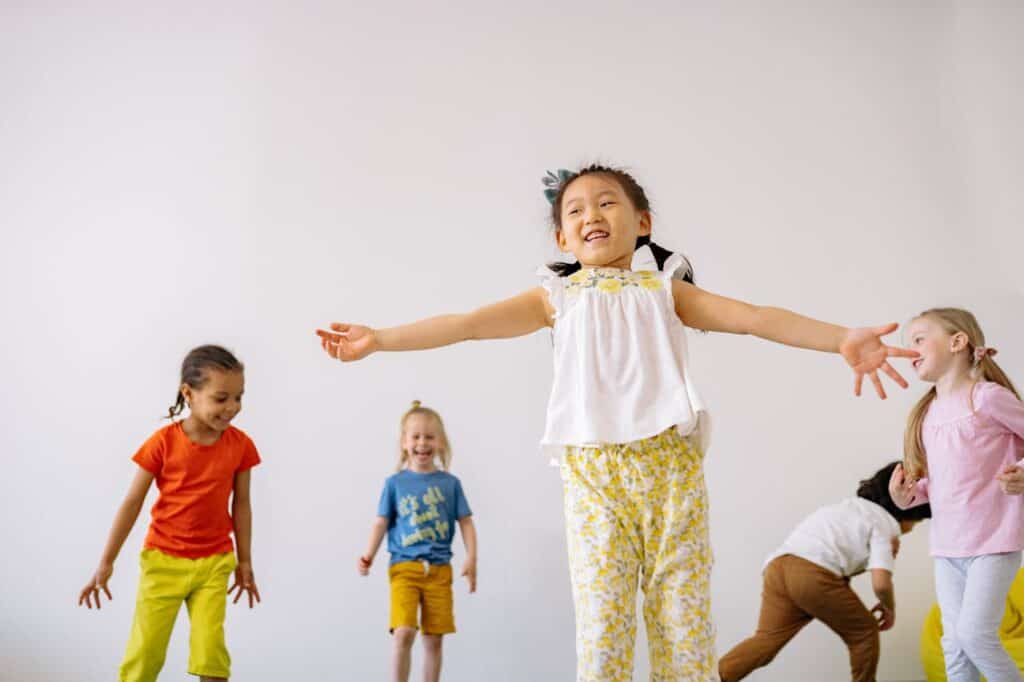
Photo by Yan Krukau
All About Me
Helping your child learn more about themselves and where they live are also great ways to help them get ready for kindergarten. Here are some key things that children should know as they enter kindergarten.
- Their name: Make sure your child knows their first and last name, especially if they go by a nickname at home. Help them begin to be able to read their name by talking about the letters. When they are ready, help them practice writing their name. Label their belongings with their name so they can begin to recognize it in print.
- Phone Number: Teach them one primary phone number for your family. Once they know that one, you can begin to share more. This is also a great thing for them to know if they are ever away from you and need a way to contact you.
- Address: Learning their address is one of the skills taught in kindergarten. Practicing this skill with your child before they start school will give them a head start. This will also help if they are ever lost or need to tell their bus driver.
- Birthdate: Talk to your child about their birthday and help them remember the date. Write it down on a calendar or post it in their room where they will see it easily.
Conclusion
Whether you have a few weeks or several months before your child starts school, these activities will help you and your child feel more confident and ready for kindergarten. By combining play with learning experiences, you’re setting your child up for success as they venture out on their next school adventure.
From outdoor adventures that spark curiosity to arts and crafts galore that ignite creativity, each moment spent exploring, creating, and discovering is a step closer to kindergarten readiness. Remember, it’s not just about ABCs and 123s—it’s about nurturing a love for learning and a spirit of exploration that will accompany your child on their educational journey.
So, go out and explore in nature, unleash your inner artist with arts and crafts, embark on counting quests, and have fun with dance party fitness. Every adventure, big or small, is a building block in preparing your child for the wonders that await in kindergarten.
Want more ideas for spending quality time with your child before they start kindergarten? Check out this post!
